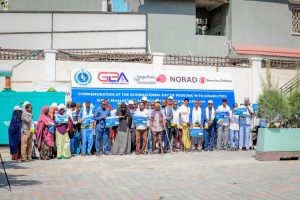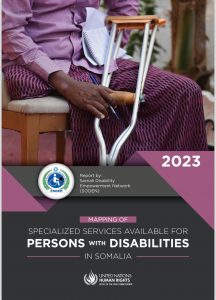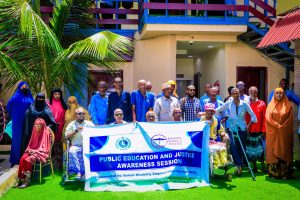Somali Disability Empowerment Network (SODEN) is a non-profit, non-governmental organization founded 2011 that assists the people with disability to build better lives through social integration, Human rights advocacy, skill development and useful representation in all aspects for the Nation.
Its headquarter is in Mogadishu capital of Somalia and has regional representatives such as in Galmudug, Puntland, and Jubbaland state with plans to increase its operations in the entire country.
Disability overview:
People with disabilities have been identified as a particularly marginalized and at-risk group within Somali society as a result of the numerous attitudinal, environmental, and institutional barriers they face, and the lack of concerted efforts to include them.
There is ample anecdotal evidence and acknowledgments that the negative experiences of people with disabilities is a pressing issue across Somalia, as well as a very small number of research reports looking at disability in Somalia.
Still numerous evidence gaps in relation to the experiences of people with disabilities living in Somalia. Even research reports which have been conducted on disability in Somalia acknowledge that little research has been produced and further research is needed (CEVSI & HI, 2012, p. 6).
The small numbers of studies which have carried out research in Somalia have focused on mainly on children with disabilities and on people with psychosocial disabilities (mental health conditions). Much of this research has had a focus on Somaliland rather than the whole of Somalia. Further research with people with different types of disabilities and in different areas of Somalia is needed to more fully understand the experiences of people with disabilities living in Somalia, the barriers and challenges they face, and how they and their families have responded to them, including in relation to livelihoods.
Alerts message to all stakeholders:
Somalia disability are sufferers for exclusion for many years in any sector in the country in terms of employment, humanitarian, political participation and access to justice and Somalia disability is considered to be 15% of the Somalia population according to WHO disability world report of 2011.
People with disability is measured to be disadvantaged and marginalized groups in the Somalia; they don’t have access participation in all social structures in the community.
Political participation
There is no representative from disabled people in Somalia participated in the government systems in terms of parliamentary, cabinet ministers, and judiciary and there is no allocated quota for Somalia disability both federal and Federal member states.
According to the recent electoral process there no single disability member voted or to be voted in the whole election process from federal to state level. This gives the Somali disabled people to be desperate and disappointed.
Recent Establishment of the lower house parliamentary election there was no single member of disabled being participated in the election. Therefore, this situation gives disabled people in the country full exclusion in the political participation process.
The 54 members of the Somalia upper house were elected by the state assembly or state lawmakers. While 275 members of the Somali lower house were elected by 14,025 delegates from the different regions in the country.
Each MP was elected by an electoral college of 51 people appointed by the 135 traditional elders. From the 51 delegates, 16 were supposed to be women, 10 from youth opportunity and remaining the 25 being members of the civil society.
Access to justice:
The disabled community in Somalia continuously distress getting suitable justice for their particular cases, they don’t receive consideration during in the courts and even in the complete process. There is no particular legal aid which supports for their cases in the courts. When they are looking for judicial services in the courts, they face discrimination, intimidation, harassment, and other challenges.
All disabled people identified similar challenges such as the inaccessible physical environment, lack of awareness in the communities, insufficient teaching skills, negative attitudes and stigma, and a severe shortage of assistive devices and mobility aids.
Human rights observers have noted that people with disabilities in Somalia are a particularly marginalized and vulnerable group who are subjected to a myriad of abuse, including unlawful killings, rape, forced marriage, and other forms of sexual violence, forced evictions, and limited access to health services, food and water, and other essential services (Civil Rights Defenders, 2017, p. 10; Nyanduga, 2016, p. 17; Nyanduga, 2015, p. 12; AI, 2015, p. 3).
People with disabilities are discriminated against by their families, the public, and the state (AI, 2015, p. 3). Their vulnerability results from the attitudinal, environmental, and institutional barriers they face, denials of their rights, and their exclusion from Somali society (MOLSA, 2012, p. 5).
It should be noted that people with disabilities are not a homogenous group and the experience of disability varies according to personal and environmental factors (MOLSA, 2012, p. 21). The most at risk of vulnerability and exclusion are the 2-3% of the Somali population who has moderate or severe impairments (Handicap International Kenya/Somalia, 2014, p. 3). However, people with disabilities in Somalia have a lot to offer if given the opportunity (AI, 2015, p. 19)
Humanitarian involvement
Disabled groups in Somalia, they live to worsen the situation of life because they are feeling situation of full exclusion in all social participation.
Even getting humanitarian aid is very limited for them and they reside in any localities in the country in rural and urban and in the IDPs camps. They need supports of recovery, resilience and also emergency and development projects.
Mr. Ali Shaabaay a disabled man who lives in Bal’ad Hirshabelle state region told to SODEN staff “we are living a critical situation and food insecurity as disabled people living in Bal’ad town 30 Km away from Mogadishu, he added there is no any humanitarian aid agency who consider us in this town so that it makes us to be our children malnutrition and hunger”
Usually, people with disability are not benefiting from humanitarian response agencies in Somalia because there is no appropriate mechanism that assists these disadvantaged people living in camps and other rural areas in Somalia,
Conclusion
Entire disability groups, disability cluster, different organizations of the disability community in Somalia, currently are sending an appeal to all stakeholders of those in and out of the country of to intervene for their particular current extremely challenges of social exclusion, abuse, lack of access to their fundamental rights including social, economic. Political and cultural rights.
Note: This is urgent appeal produced the last meeting of 20th September 2019 of disability groups meeting held in SODEN office Mogadishu-Somalia





